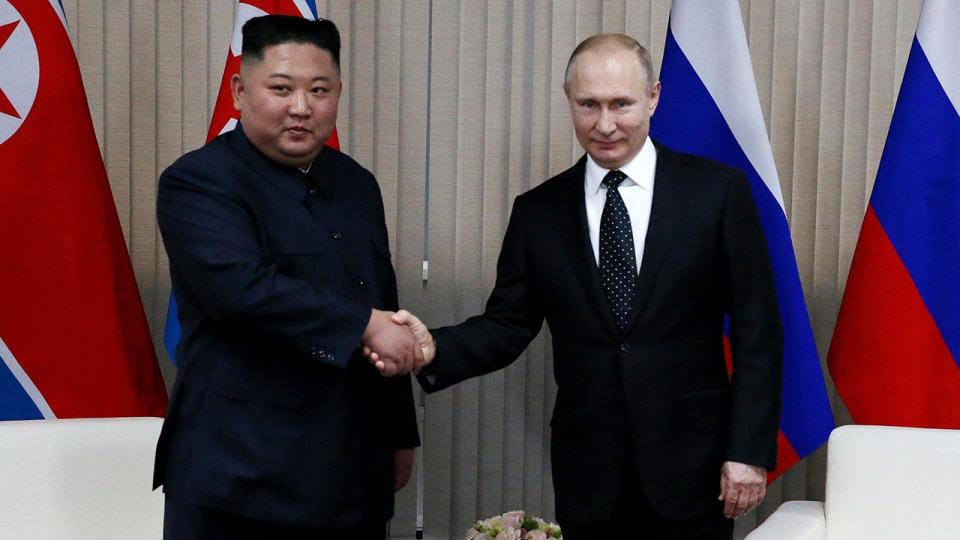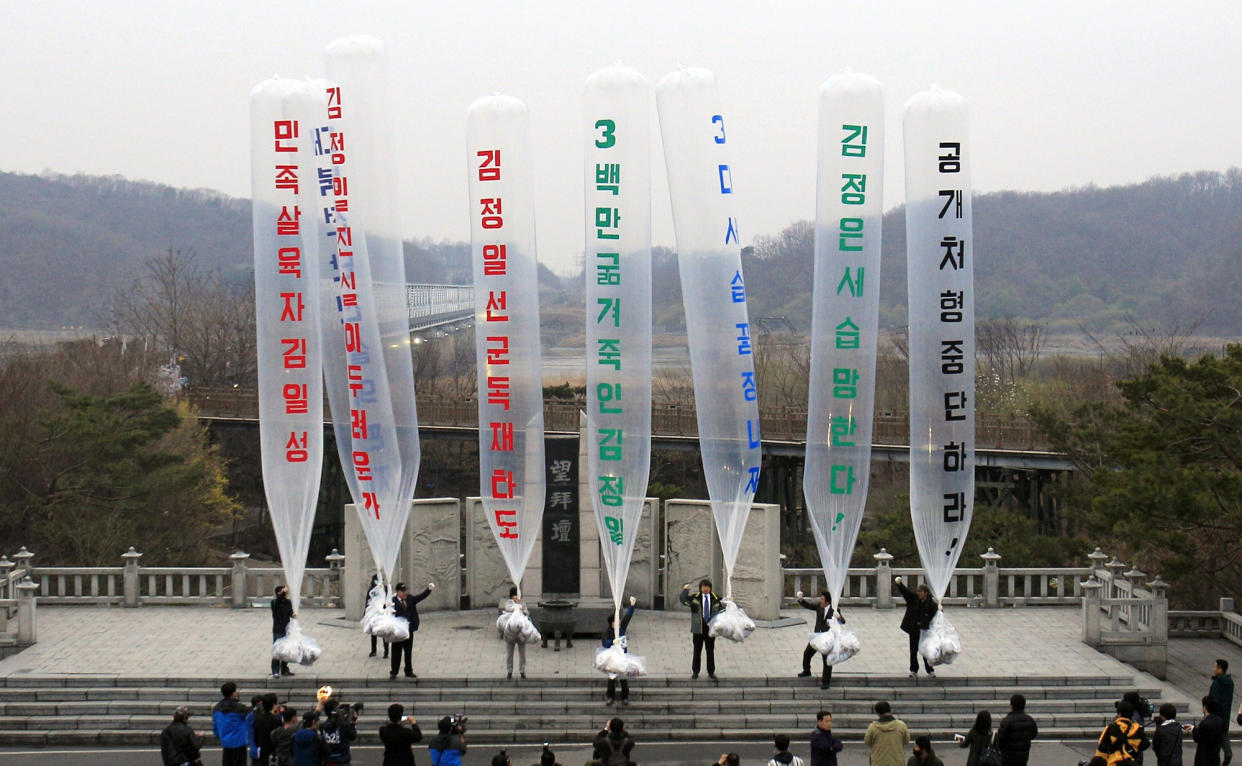North Korea on Wednesday criticized rival South Korea for removing a law that banned private activists from sending anti-Pyongyang propaganda leaflets to the North, insisting that such activities amount to psychological warfare and threatening to respond with a “shower of shells.”
"Park Sang-hak, center, a refugee from the North who runs the group Fighters for a Free North Korea from a small Seoul office, and South Korean conservative activists prepare to release balloons bearing leaflets condemning the North Korean leader during an anti-North Korea rally against the 99th anniversary of Kim Il Sung's birth, called "The Day of the Sun," at the Imjingak Pavilion near the border village of Panmunjom in Paju, South Korea, on April 15, 2011. North Korea on Wednesday, Nov. 8, 2023 criticized rival South Korea for removing a law that banned private activists from sending anti-Pyongyang propaganda leaflets to the North, insisting that such activities amount to psychological warfare and threatening to respond with a “shower of shells.” The balloons read "Overthrow Kim Jong Il's dictatorship."
The statement published by North Korea’s official Korean Central News Agency was the first time state media commented on the decision by South Korea’s Constitutional Court in September to invalidate a 2020 law that criminalized leafletting. The decision was based on concerns that it excessively restricted free speech.
The ruling came in response to a complaint filed by North Korean defector-activists in the South. They included Park Sang-hak, who has been a frequent target of North Korean government anger for his yearslong campaign of flying leaflets across the border with giant balloons.
North Korea is extremely sensitive about any outside attempt to undermine leadership of authoritarian ruler Kim Jong Un as he maintains tight control over the country’s 26 million people while severely restricting their access to foreign news.
The law, crafted by the previous liberal government in Seoul that pursued inter-Korean engagement, was passed six months after the North expressed its frustration over the leaflets by blowing up an inter-Korean liaison office in the North Korean border town of Kaesong in June 2020.
Tensions between the Koreas are at their highest point years as the pace of both Kim’s weapons tests and the South Korea’s combined military exercises with the United States have intensified in a tit-for-tat cycle.
In comments attributed to a political commentator, the KCNA warned that the North in the current state of tensions would consider leafletting as a “high-level psychological warfare” and even a “pre-emptive attack conducted before a start of war.”
“Under the present situation where a spark may lead to explosion, there is no guarantee that such military conflicts as in Europe and the Middle East would not break out on the Korean Peninsula,” the KCNA said, apparently referring to Russia’s war on Ukraine and the violence in Israel and Gaza.
The agency claimed that future leafletting campaigns could trigger an unprecedented response from North Korea’s military, which stands ready to “pour a shower of shells” toward the sites where the leaflets are launched as well as the “bulwark of the region of (south) Korean puppets.”
While North Korea often makes bizarre threats that aren’t carried out, the comments still reflected the animosity between the rival Koreas amid a prolonged freeze in diplomacy.
Aside from blowing up the liaison office, the North in 2022 blamed its COVID-19 outbreak on balloons flown from South Korea, a highly questionable claim that appeared to be an attempt to hold its rival responsible amid growing tensions over its nuclear weapons program.
In 2014, North Korea also fired at propaganda balloons flying toward its territory. South Korea then returned fire, but there were no casualties.
Park and other defectors from the North for years have used huge helium-filled balloons to launch leaflets criticizing Kim’s leadership, his nuclear weapons ambitions and the country’s dismal human rights record. The leaflets are often packaged with U.S. dollar bills. and USB sticks containing information about world news.
In his latest launch on Sept. 20, Park said he flew 20 balloons carrying 200,000 leaflets and 1,000 USB sticks from the South Korean border island of Ganghwa.
U.S. Secretary of State Antony Blinken attends meeting at the foreign ministry in Tokyo.
Blinken visits South Korea as North Korea, Russia deepen ties.
U.S. Secretary of State is due to arrive in Seoul on Wednesday for talks with his South Korean counterpart, as the allies step up cooperation in the face of growing concerns over North Korea's closer military ties with Russia.
The two-day visit, the first by a U.S. secretary of state in two and a half years, is part of Blinken's broader Asia trip that has included meetings with G7 counterparts and bilateral talks with Japanese officials in Tokyo, as well as a later stop in India amid the Israel-Hamas conflict.
The Seoul visit comes as the United States and South Korea, along with Japan, have condemned what they say is the supply of arms and military equipment by North Korea to Russia.
Washington and Seoul see the closer military ties between the North and Russia, which is thought to be suffering depleting stocks of munitions in its war with Ukraine, as an effort by Pyongyang to secure strategic military capabilities in return.
North Korea is preparing to launch a spy satellite after having failed twice this year to put one in orbit.
South Korea's spy agency said last week North Korea was in the final stages of preparations for the launch after apparently receiving technical assistance from Russia.
Pyongyang and Moscow have denied claims of arms deals while their leaders pledged closer military cooperation when they met in September in Russia's far east.
South Korea's military said on Monday it was on alert over possible North Korea provocations after Pyongyang designated Nov. 18 as "missile industry day" to commemorate the country's launch of an intercontinental ballistic missile (ICBM) last year.
North Korea in November in 2022 tested the Hwasong-17 ICBM, a weapon potentially able to deliver a nuclear warhead to anywhere in the United States.
With aid from the United States, South Korea also plans to launch its first spy satellite on Nov. 30 on a SpaceX Falcon-9 rocket from the U.S. military's Vandenberg base.
A U.S. official has said the United States remained focused on the Indo-Pacific despite other global challenges and Blinken's trip demonstrated such "enduring" commitment.
U.S. Secretary of Defense Lloyd Austin is also due to visit South Korea this week on a trip that will include Indonesia and India.
In Washington, U.S. and South Korean officials held talks on North Korea's illicit cyber activities that they say fund its unlawful weapons programs, South Korea's foreign ministry said.
Sanctions monitors have accused the reclusive state of using cyberattacks to gather funds for its nuclear and missile programs, and a United Nations report said the North stepped up its cryptocurrency thefts, using sophisticated techniques to steal more in 2022 than any other year.
North Korea spy satellite program receiving technical assistance from Russia, South Korea warns.
South Korean intelligence indicates Russia has been assisting North Korea in the construction and launch of its latest spy satellite.
The South Korean Unification Ministry addressed the suspected collaboration on Monday, stating that North Korea is likely to move forward with the launch in the coming months.
"It is hard to predict when North Korea will make the third attempt for the launch. But there seem to be signs of the North receiving technical assistance from Russia," South Korean Unification Minister Kim Yung-ho said, according to Yonhap News Agency.

He added, "There is a very high possibility that North Korea will make provocations once it completes making up for technical problems."
North Korea previously attempted satellite launches in May and August — both ended in failure due to technical issues.
North Korean leader Kim Jong Un and Russian President Vladimir Putin have strengthened diplomatic ties over the last few months, meeting face-to-face in September.
The two countries have collaborated on military technology and expanded trade in an effort to strengthen regional power alongside China.
In response to international criticism, North Korean Foreign Minister Choe Son Hui said North Korea's adversaries, "have vital geopolitical interests in illegalizing the DPRK-Russia relations, in view of the present international political situation and the crises the U.S., Japan and [South Korea] are facing at home and abroad."
Last month, South Korea, the U.S. and Japan strongly condemned North Korea’s alleged supply of munitions and military equipment to Russia, saying such weapons shipments sharply increased the human toll of Russia’s war in Ukraine.
Any weapons trade with North Korea would be a violation of multiple U.N. Security Council resolutions that Russia, a permanent U.N. Security Council member, previously endorsed.




